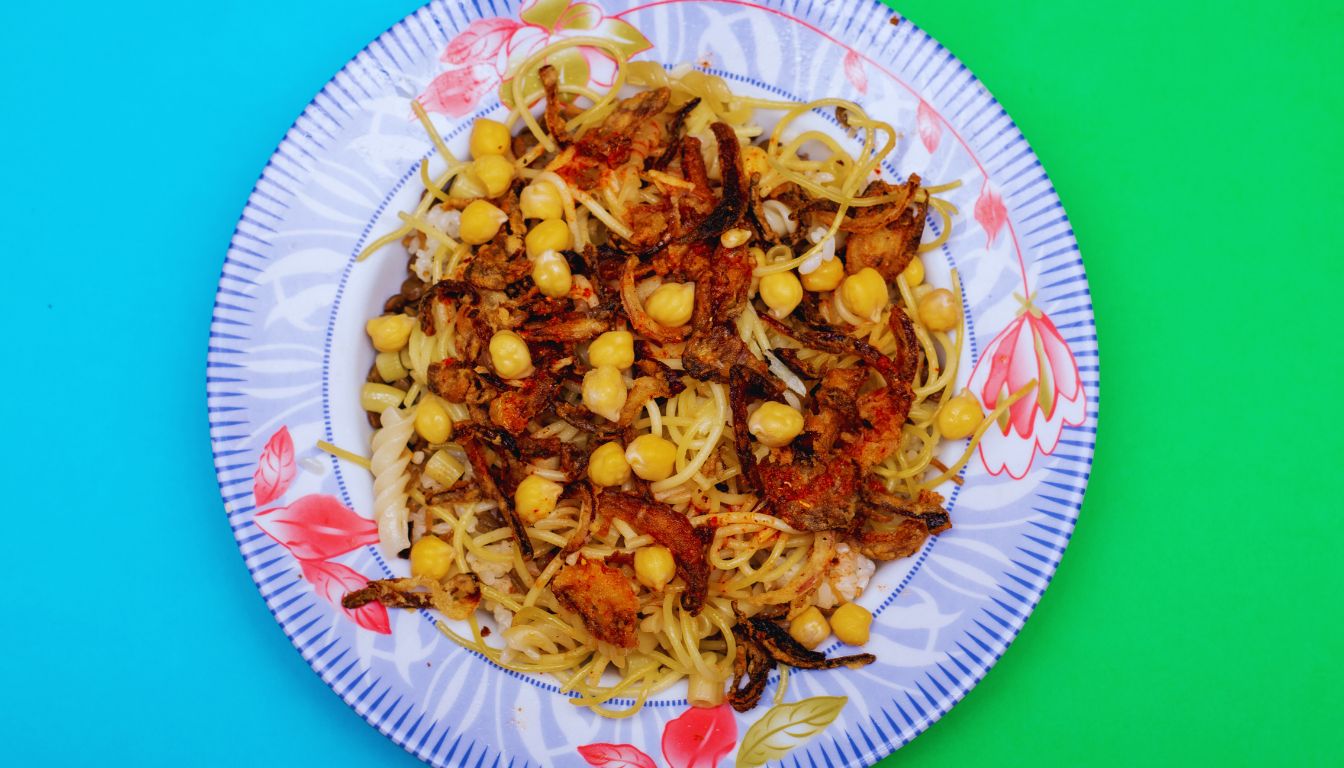Koshari, Cairo Egypt
In the bustling streets of Cairo, where ancient history meets modern life, there’s one dish that unites Egyptians across all social classes – Koshari. This harmonious blend of lentils, rice, pasta, and spiced tomato sauce tells the story of Egypt’s multicultural heritage in every warm, comforting bowl. As Cairo’s most celebrated street food, Koshari embodies the city’s spirit of cultural fusion and community, serving as both daily sustenance and a source of national pride.
Table of Contents
Historical and Cultural Significance
Koshari’s fascinating journey to becoming Egypt’s national dish reflects the country’s rich history of cultural exchange and adaptation. Born from the intersection of various culinary traditions:
- Origins: Originated during the British colonial period in the late 1800s
- Indian Influence: The concept was inspired by an Indian dish called Kitchari
- Italian Impact: Pasta was added during the influx of Italian workers in the 19th century
- Egyptian Innovation: Local cooks transformed it by adding tomato sauce and crispy onions
The dish’s popularity exploded during the economic challenges of the 1950s when Egyptians sought affordable, filling meals. Today, Koshari represents:
- Symbol of Egyptian resourcefulness
- Demonstration of cultural adaptation
- Expression of national identity
- Celebration of street food culture
Ingredients and Preparation
The magic of Koshari lies in its careful layering of ingredients and the precise preparation of each component:
Base Components:
- Short-grain rice
- Brown lentils
- Elbow macaroni
- Ditalini pasta
- Vermicelli
Signature Toppings:
- Spiced tomato sauce (dakka)
- Crispy fried onions
- Garlic vinegar sauce
- Hot chili sauce (shatta)
- Chickpeas
Preparation Process:
- Lentils and rice cooked separately until perfectly tender
- Pasta boiled al dente
- Onions sliced thin and fried until golden brown
- Tomato sauce simmered with special spice blend
- Each element layered in specific order for optimal taste
Where to Try It
Cairo offers numerous renowned Koshari establishments, each with its unique take on this beloved dish:
Historic Establishments:
- Koshari Abou Tarek: Multi-story landmark known for generous portions
- Koshari El-Tahrir: A downtown institution since 1945
- El-Koshari El-Masry: Famous for its perfectly spiced sauce
- Sayed Hanafy: Local favorite in the heart of Islamic Cairo
Neighborhood Spots:
- Street vendors in Khan el-Khalili
- Family-run establishments in Downtown Cairo
- Modern cafes in Zamalek
- Local joints in Mohandessin
Eating Etiquette and Customs
Understanding how to eat Koshari enhances the authentic experience:
- Mix ingredients thoroughly before eating
- Use a spoon – the traditional utensil for Koshari
- Add sauces gradually to control heat and flavor
- Common Custom: Start with a small portion of sauce and adjust to taste
- Acceptable to request extra of any component
Seasonal Considerations
While Koshari is enjoyed year-round, certain times offer unique experiences:
Peak Seasons:
- Winter months (December-February): Perfect for warm comfort food
- Ramadan evenings: Special preparations and festive atmosphere
- School and work lunch hours: Experience local dining culture
Weather Considerations:
- Air-conditioned restaurants during summer months
- Outdoor seating in winter and spring
- Take-away options available year-round
Modern Interpretations
Contemporary Egyptian chefs are reimagining this classic while maintaining its essence:
- Healthier versions using whole grain pasta
- Gluten-free adaptations
- Upscale restaurant presentations
- Creative sauce variations
- International fusion elements
Practical Information and Travel Tips
Best Times to Visit:
- Lunch hours: 1:00-3:00 PM
- Evening hours: 7:00-10:00 PM
- Avoid peak prayer times
- Consider local rush hours
Ordering Tips:
- Learn basic Arabic phrases:
- “Wahad Koshari” (One Koshari)
- “Min fadlak” (Please)
- “Shokran” (Thank you)
- Specify portion size: Small, Medium, or Large
- Request sauce preferences
- Ask for extra crispy onions if desired
Budget Considerations:
- Average cost: 15-40 EGP ($0.50-2.50 USD)
- Extra toppings may incur additional charges
- Many places are cash-only
- Tipping is appreciated but not mandatory
Making Your Koshari Journey Memorable
Immerse yourself in Cairo’s vibrant street food culture by trying Koshari at different establishments throughout your stay. Engage with local vendors, observe the masterful preparation process, and don’t shy away from experimenting with different sauce combinations. Remember that each bowl of Koshari carries centuries of Egyptian culinary wisdom and cultural fusion, making every bite a taste of Cairo’s rich heritage.













